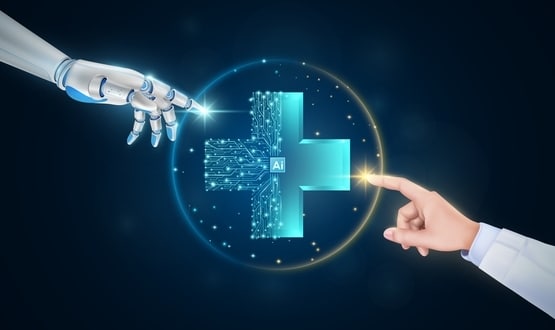King’s College London AI tool to predict health events
- 11 April 2024

A new study led by King’s College London has demonstrated the potential of Foresight, an AI tool, to predict the health trajectory of patient by forecasting future disorders, symptoms, medications and procedures.
The tool was developed by King’s College London and is trained on existing healthcare data from NHS electronic health records. It uses a deep learning approach to recognise complex patterns in both the structured and unstructured data of electronic health records to produce insights and predictions.
According to the researchers – who come from King’s College London, UCL, King’s College Hospital NHS Foundation Trust and Guy’s and St Thomas’ NHS Foundation Trust – the tool has the potential to be used to support clinical decision-making, monitoring in healthcare settings and to improve clinical trials.
Data driven performance
The researchers trained three different models of Foresight, using data from over 811,000 patients across King’s College Hospital NHS FT, Maudsley NHS Foundation Trust and MIMIC-III, a publicly available dataset of patients from Beth Israel Deaconess Medical Center in the US.
The researchers extracted and processed the unstructured (free-text) and structured data (age, ethnicity and sex) within electronic health records (EHRs) using CogStack, of which Foresight is a part of. Performance of the tool was measured by comparing its predictions to what actually happened to the patients as described in their records, in a smaller subset of these data.
Professor Richard Dobson, professor of medical informatics at King’s College London, theme lead for informatics at the National Institute for Health and Care Research (NIHR) Maudsley Biomedical Research Centre (BRC) and professor of biomedical and health informatics at UCL, told Digital Health News: “It is trained on vast amounts of real-world NHS data and it utilises the free text contained within doctors’ notes, reports, letters etc, which is usually ignored but contains rich, detailed information that makes up >80% of a patient’s record. It therefore captures deep and subtle phenotypic information.”
Strong results
When forecasting the next 10 possible disorders that could appear in a patient’s timeline, the tests showed that Foresight correctly identified the next disorder 68 percent and 76 percent of the time at King’s College Hospital NHS FT and South London and Maudsley NHS FT respectively. This rose to 88 percent of the time in the US MIMIC-III dataset. Similarly, when forecasting the next new biomedical concept – which could be a disorder, symptom, relapse or medication – the precision achieved with Foresight was 80 per cent, 81 percent and 91 percent respectively.
Professor James Teo, professor of neurology at King’s College London and joint director for data science and artificial intelligence at King’s College Hospital NHS FT and Guy’s and St Thomas’ Hospital NHS FT, outlined to Digital Health News how the tool could be deployed in the NHS. He said: “In the near-term, this technology would support virtual trials to find potential new avenues of treatments, assess possible complications and evaluate outcomes. It would also be possible to find unexpected complications or adverse events not detected through traditional means. Educationally, it is also a helpful tool for teaching realistic outcomes of imaginary patient scenarios rather than rarified but improbable textbook scenarios in medical examinations.
“In the long-term, if safely regulated, this technology could allow patients and clinicians to envisage possible outcomes (both probable and improbable) for a specific individual to inform decision-making on care. Doctors and patients can make more informed decisions about their care as they can weigh up possible outcomes before embarking (or not embarking) on a specific medication or treatment.”
Outlining potential
The paper – Foresight – Generative Pretrained Transformer (GPT) for Modelling of Patients Timelines using EHRs: A Retrospective Study, is published in The Lancet Digital Health. The paper was part of a programme of work that received funding from the NHS AI Lab, National Institute for Health and Care Research and Health Data Research UK. It has infrastructure support from King’s College Hospital NHS FT, NIHR Maudsley BRC and the London AI Centre for Value-Based Healthcare.
The tool could be an exciting opportunity for the NHS, particularly with development underway of Foresight version 2. According to Professor Teo the new version will: “incorporate more information about context as well as benefit from CogStack’s continued learning about medical language in King’s College Hospital NHS FT, Guy’s and St Thomas’ NHS FT, South London and Maudsley NHS FT and University College London Hospitals NHS FT. Further versions could aim to be multimodal and incorporate not just the text descriptions of a scan or tissue sample, but to incorporate the picture.”
Professor Dobson added: “As well as testing with the RTA, we are deploying Foresight on NHS England national data where it will learn from data of unprecedented scale, approximately 56m patients. We’re also deploying Foresight into some of our existing CogStack-enabled trusts and new ones just coming onboard with CogStack technology…
“We’re very excited about Foresight 2, results are looking very promising indeed. It improves on the original in several ways, including the use of contextual information for each concept and using pre-trained Large Language Models rather than training from the ground up. We’re hoping to be able to show initial results soon.”



